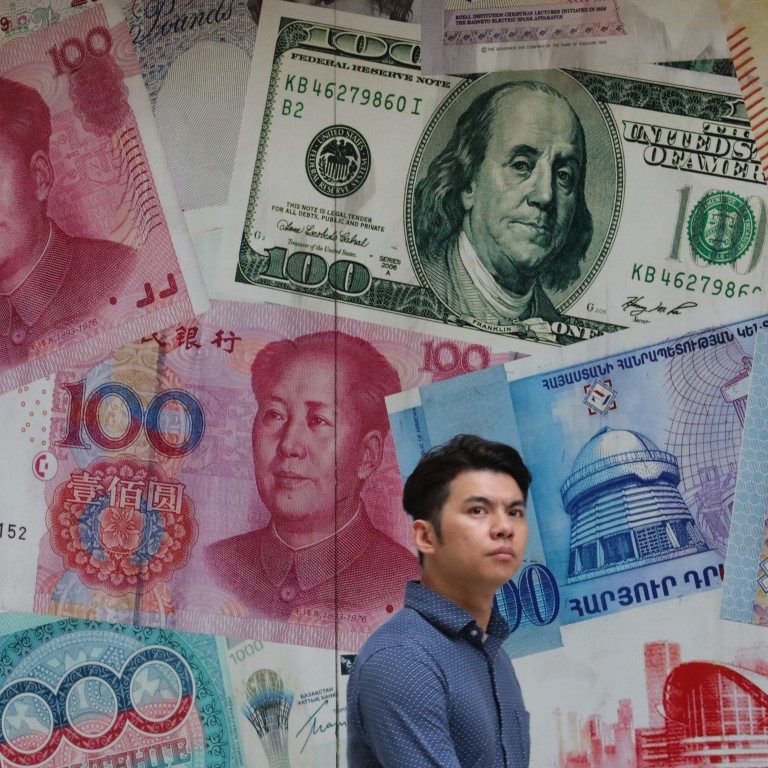
Is China’s ‘currency manipulator’ tag the start of a global recession, currency war?
- China allowed the yuan to weaken below 7 to the dollar on Monday, raising fears of a financial crisis and global recession
- The value of the yuan has been a key focus for US President Donald Trump during the trade war
The United States’ decision to label China a “currency manipulator” after the yuan’s exchange rate weakened beyond a closely watched barrier is raising the question of whether the world’s two largest countries have started a currency war as part of a broadening economic conflict.
Traders and analysts worry that a sliding yuan could trigger a global currency war, also known as competitive devaluations, where two or more countries take steps to lower the value of their currencies in a vicious cycle to gain a competitive advantage for their exports.
The threat of a currency war and rapid escalation of trade tensions could easily spiral into a sharp global financial crisis and global economic downturn, they added.
“This could be the first step in the race to the bottom for currencies,” said Bank of America Merrill Lynch. “The trade war has escalated and threatens to worsen from here. This means greater uncertainty which weighs on business investment.”
The Trump administration maintains that a country can be considered to have manipulated its currency if it allows the currency to weaken due to market forces after having supported it for a long period of time, US Treasury Secretary Steven Mnuchin said on the sidelines of the G20 summit in Japan in June.
It was a definition that runs opposite to what market players widely accept as currency manipulation – that is, that a currency weakens due to official intervention rather than by demand and supply.
China’s designation as a currency manipulator starts a formal process under the Omnibus Trade and Competitiveness Act of 1988 to address what the US sees as the unfair competitive advantage in trade from a cheaper yuan through bilateral talks with China or intermediation via the International Monetary Fund (IMF).
The trade war has escalated and threatens to worsen from here. This means greater uncertainty which weighs on business investment
The issue now is how far the currency depreciation will be allowed to go.
The 1.5 per cent drop so far this week has dragged 10 regional currencies lower, and also rattled global stock and bond markets. Analysts expect the People’s Bank of China (PBOC) to be less active in supporting the value of the yuan during times of stress, potentially leading to further depreciation while trade tensions remain high. The yuan may gradually decline to 7.2 per dollar this year from the rate of 7.045 against the US dollar in late Asian trading on Thursday.
“It’s very important from China’s perspective to not be seen as a country whose decisions have led to large economic upheavals internationally,” said Louis Kuijs, head of Asia economics at Oxford Economics.
“Because when the RMB moves a little bit, other currencies move even more. We also saw that on Monday and this is something they are aware of, the role of the RMB globally.”
Analysts in the US doubt that the US government would order any direct intervention in foreign exchange markets to push the US dollar lower even if policymakers judge that China or other foreign counterparts are artificially weakening their currencies. If that happened, a large scale foreign exchange intervention would be needed given the US dollar’s global reserve status, and chances of other countries joining would be low.
In contrast, in the 1985 Plaza Accord, the G5 nations – France, Germany, the US, Britain and Japan – had to reach an agreement to manipulate the exchange rates before depreciating the US dollar relative to the Japanese yen and the German Deutsche mark.
There’s been a big part of the markets that’s been comforted by the idea that Trump is not going to turn crazy
“There’s been a big part of the markets that’s been comforted by the idea that Trump is not going to turn crazy,” said Cliff Tan, east Asian head of global markets research at Japanese lender, MUFJ Bank.
“But if you have the whole global economic order in disarray, the exchange rate movements that result are not really matters of strategy, they’re just market reactions to a rapidly changing set of policies.”
Trump has long complained of the US dollar’s strength and has indicated that he would like the US Federal Reserve to reduce interest rates further to weaken the dollar and counter actions from China and other countries.
“Our problem is a Federal Reserve that is too proud to admit their mistake of acting too fast and tightening too much (and that I was right!). They must cut rates bigger and faster, and stop their ridiculous quantitative tightening now,” Trump tweeted on Wednesday.
With the loss of business confidence in the global economy and uncertainty in financial markets, a synchronised global easing cycle may already be taking place to prop up growth, which ultimately would also exert downward pressure on currencies.
It’s very important from China’s perspective to not be seen as a country whose decisions have led to large economic upheavals internationally
Central banks in Thailand, India, New Zealand and the Philippines have kicked off with interest rate cuts on Wednesday and Thursday, with pressure mounting for the European Central Bank to follow suit at its next meeting next week.
Japan’s top currency diplomat, Yoshiki Takeuchi, this week also signalled that Tokyo was ready to intervene in the currency market if excessive yen gains threatened to hurt the country’s export-reliant economy.
“[US Federal Reserve] easing is likely to be the most effective long-term means of weakening the US dollar,” said Steve Englander, global head of G10 FX research and North America macro strategy at Standard Chartered Bank.
“The immediate asset market response is likely to add downward pressure on equities, bond yields and risk-correlated currencies.”

